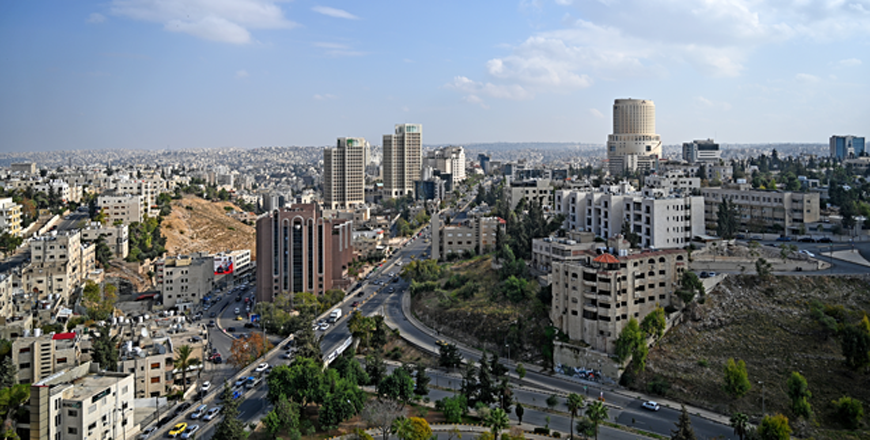You are here
Moody’s upgrades Jordan’s outlook from ‘stable’ to ‘positive’ citing recent fiscal strengths
By JT - Nov 17,2022 - Last updated at Nov 19,2022

Sovereign credit rating agency Moody’s has upgraded Jordan’s credit outlook from 'stable' to 'positive' (Photo by Amjad Ghsoun)
AMMAN — Sovereign credit rating agency Moody’s has upgraded Jordan’s credit outlook from “stable” to “positive”, shifting its overall rating from B1 — stable to B1 — positive, according to the Finance Ministry.
According to Moody’s, “the change in outlook to positive from stable is driven by the government’s strong commitment to wide-ranging structural reforms and track record of effective implementation at least on the fiscal front, which have the potential to raise the resilience of its credit profile”.
The revenue gains made by the Ministry of Finance in recent years, "are likely to prove durable, as the tax administration-related reforms target increasing tax compliance".
Moody’s has also cited the expansion in government revenue, as well as the latest set of economic and administrative reforms which “may also increase the economy’s growth prospects over time and increase its shock absorption capacity”.
The credit rating agency also cited “governance strengths that support Jordan’s resilience to the significant global headwinds”.
This credit rating is despite what Moody’s refers to as a “volatile regional geopolitical environment” and resulting pressures, which have led to global downgrades of numerous countries this year.
Commenting on the credit upgrade, Minister of Finance Mohamad Al-Ississ has said: “This is a testament to what happens when Jordan is given the space to reform on its own terms in a spirit of collaboration with its partners, we do reform in the right and most sustainable way.”
Al-Ississ also noted, “our fiscal reform has shown that fair and equitable reform is not only good policy, but produces the best results as well.”
Governor of the Central Bank of Jordan (CBJ), Adel Al Sharkas, affirmed: “This upgrade in Jordan’s outlook reflects the CBJ’s success in maintaining monetary and financial stability; by maintaining the pegged exchange rate regime supported by the high level of international reserves, with full capital mobility and very low convertibility risks.”
Sharkas also indicated that “inflation in Jordan remained moderate despite the high inflationary pressures overall the world, which indicates robust macroeconomic stability in the Kingdom”.
Sharkas also stressed “the dominant and pivotal role played by the presence of a robust and resilient banking system with a high level of capital and liquidity buffers, along with the high quality of financial assets, as shown by banks’ macro prudential indicators”.
“Monetary and financial stability is a key motive for optimism in the continued recovery of the national economy, on the back of the pandemic. This optimism is supported by GDP growth during the second quarter of this year that exceeded all expectations, along with the high performance of many leading indicators in various sectors, especially the tourism, exports foreign investment inflows, and workers’ remittances,” Sharkas said.
“Moody’s expects the general government fiscal deficit to narrow to around 2-2.5 per cent of GDP in 2023-24, compared to around 5 per cent in 2020 and 3 per cent in 2021, while the central government fiscal deficit will likely average 4.5 per cent of GDP in 2023-24, compared to 7 per cent in 2020 and 5.3 per cent in 2021,”the rating agency’s website said.
“Moody’s fiscal forecasts imply that the government’s debt burden will decline over the next few years to pre-pandemic levels of around 78 per cent of GDP by 2026, although it remains high compared to similarly rated peers. General government debt likely peaked at just above 90% of GDP at the end of 2021,” the Moody’s website said.
Moody’s definition of general government debt includes all of Jordan’s central government and municipality debt, net of holdings by the social security fund (SSIF), plus the guaranteed debt of the state-owned enterprises in the energy and water sectors, National Electric Power Company (NEPCO) and Water Authority of Jordan (WAJ). Both NEPCO and WAJ require financial support from the central government currently, according to the website.
The rating agency’s website noted that the government has largely avoided increasing central government expenditure despite the focus on social protection with higher global food and energy prices.
The policy of stockpiling wheat, which started in 2020 as the government foresaw food security risks, and long-term gas contracts with limited price sensitivity to global oil price benchmarks that the government entered into with neighbouring countries have prevented a material increase in spending on these essentials, Moody’s said.
Related Articles
AMMAN — Sovereign credit rating agency Moody’s Ratings upgraded the Kingdom’s long-term local and foreign currency issuer ratings to Ba3 fro
AMMAN — Despite the regional turmoil, sovereign credit rating agency Fitch upheld the Kingdom’s rating at “BB-", affirming a stable ou
AMMAN — Sovereign credit rating agency Moody’s Ratings has maintained Jordan’s credit rating at Ba3 with a stable outlook, according to a re


















